5. Frightmare (1974)
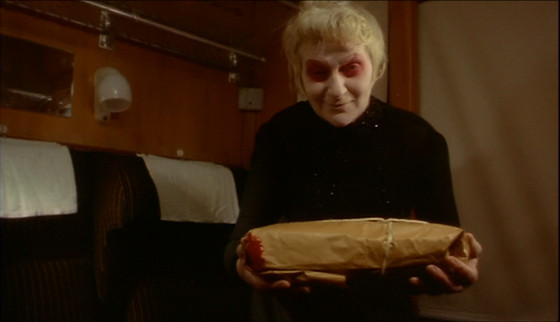
The idea of ineluctable fate and the question around how able we are to outrun our parents’ demons were some of the elements that made “Hereditary” such a fascinating piece of art. “Madness crossing generations” theme appeared in some horror films before, including this somewhat forgotten film directed by Pete Walker, who said he wanted to make a film which would make audiences to leave the cinema feeling angry and frustrated after seeing it. And yes, he succeeds at it.
If you’re familiar with Walker’s work, less or more you know what to expect out of the film. He was one of the few British exploitation horror directors to make any impact back in the 70’s and even though, some part of the film is slightly dated, it still remains as a fun film to watch. It’s one of Walker’s better efforts as it’s really well-written and acted.
When it comes to acting, British character actress Sheila Keith deserves a special shout-out. Walker understood her ability to play odd characters well and gave her the right material to shine. “Frightmare” may be unpleasant film to watch for some, as it’s very bleak for sure. So much so that it even used to be called as Britain’s answer to “Texas Chain Saw Massacre”.
If you have a thing for 70s British horrors, particularly exploitation movies then “Frightmare” would make an excellent choice. If you don’t know a thing about the exploitation films of the era, then it can also very well be a good choice to start exploring them.
4. The Wicker Man (1973)
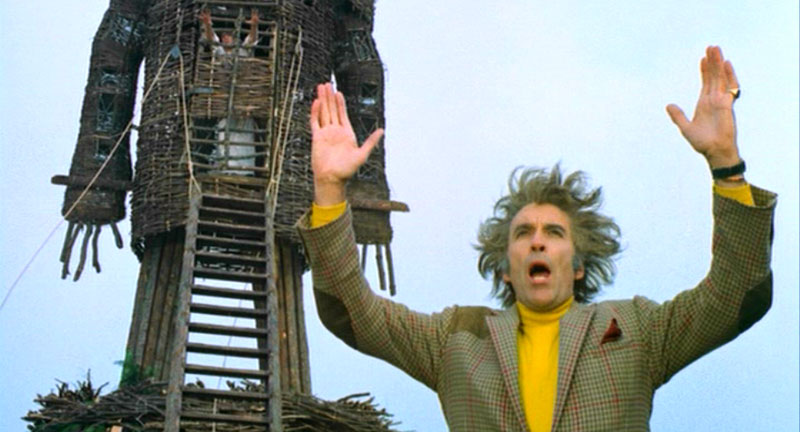
As mentioned above, some audience members didn’t like the ending to “Hereditary” but many others certainly did. It’s the cruel nature of the ending which both surprised and terrified them.
“The Wicker Man” is one of the best examples of it, having one of the most unforgettable and deeply disturbing endings of the film which is often regarded as one of the scariest moments in horror film history by movie buffs and film critics alike.
The film is about a police sergeant who is sent to a Scottish island village in search of a missing girl whom the townsfolk claim never existed. He never stops investigating the subject but he doesn’t know what’s waiting for him in the end. The ending sequence has now almost become a notable part of British pop-culture and even though Ari Aster didn’t mention this film among the influences –he said it’s a major influence on the new film he’s working currently.
Actor Christopher Lee – who excels in his part – also used to say it’s the best film he had ever been part of. Even during the 2012 Summer Olympics opening ceremony the film was included as part of a sequence that celebrated British cinema as it should be.
It’s one of the best films ever came out of the country. Wait, you had seen it already? Did you like it? If you did, then you can check out recent Wicker Man-inspired film “The Ritual” (2017) then, which is not brilliant maybe but worth to watch if you’re a fan of such stories.
And yes, if you didn’t know, that Nicolas Cage film with the same title is actually a remake of this one. And yes, not a good one but it definitely works as a (unintentional) comedy film.
3. The Innocents (1961)
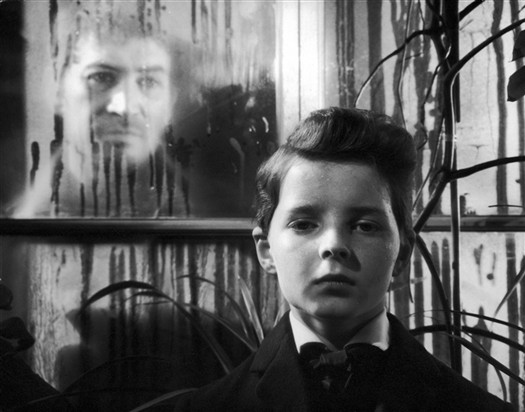
Claustrophobic feeling often works in horror films in the hands of the right director, cinematographer and the editor. Some of “Hereditary”’s shots tend to feel claustrophobic which makes the atmosphere of the film even more engaging and terrifying at the same time. It gives some kind of uneasy feeling.
By only watching “Hereditary”, it’s easy to tell that Aster is a true cinephile as he knows what made horror masterpieces of previous decades work and that having a distinctive cinematography is one of them.
Just like what Jack Clayton did in one of Aster’s favorite films “The Innocents”, along with his cinematographer Freddie Francis. They created such unusual cinematography for their time with their technique of using minimal lighting as well as deep focus which left a strong impact on movie-goers.
After all these years, film still captives the horror fans with its atmosphere and style. It continues to be a part of academic discussions for its underlying themes, particularly the sexual repression. Deborah Kerr is also excellent as ever in the leading role.
2. Don’t Look Now (1973)
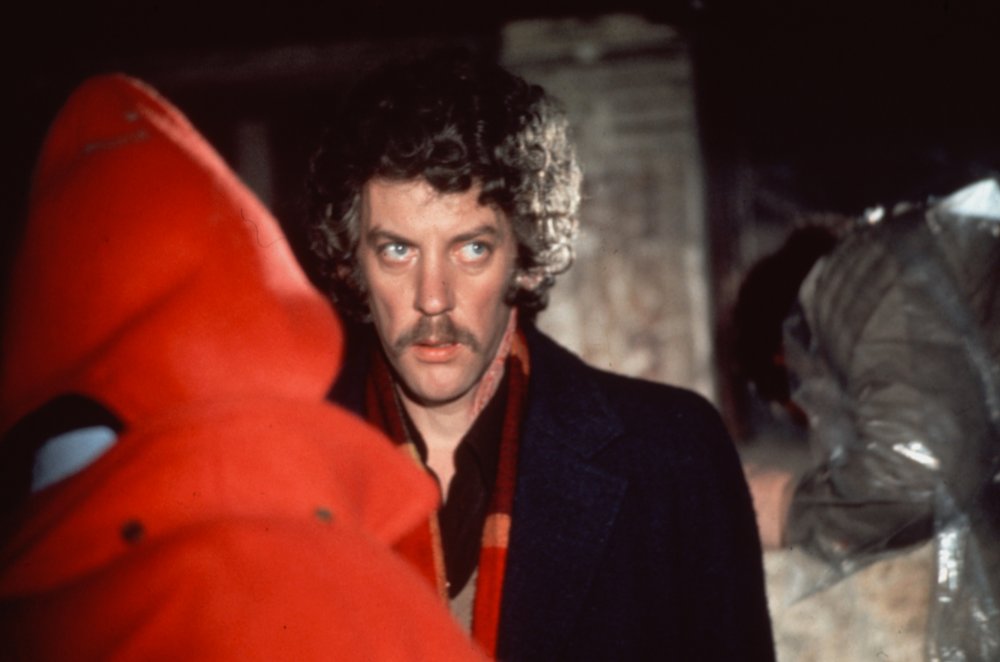
Another powerful mix of family drama/grief theme with horror. Nicolas Roeg is widely regarded as genius of British cinema, whose works include “Performance”, “Walkabout” and “The Man Who Fell to Earth” but probably none of them – as great as they are – became iconic and influential as much as “Don’t Look Now” did.
Just last year in Martin McDonagh’s “Three Billboards Outside Ebbing, Missouri”, there was a scene where Sam Rockwell’s character watching it with his mother and it was not the first time McDonagh made a clear reference to the film. It’s not just him, many horror and non-horror fans have cited this Roeg masterpiece as an important influence on their work.
Everything that made it unique and distinctive still remain impressive – that controversial love scene, gorgeous score, remarkable use of Venice locations, tour-de-force performances from Julie Christie and Donald Sutherland, almost revolutionary editing work, and that devastating ending.
Roeg had been very brutal with his images which show itself in numerous occasions through the film. Ari Aster is clearly influenced not only from the cinematic language of Roeg but some of the plot points of the film as well.
1. Rosemary’s Baby (1969)
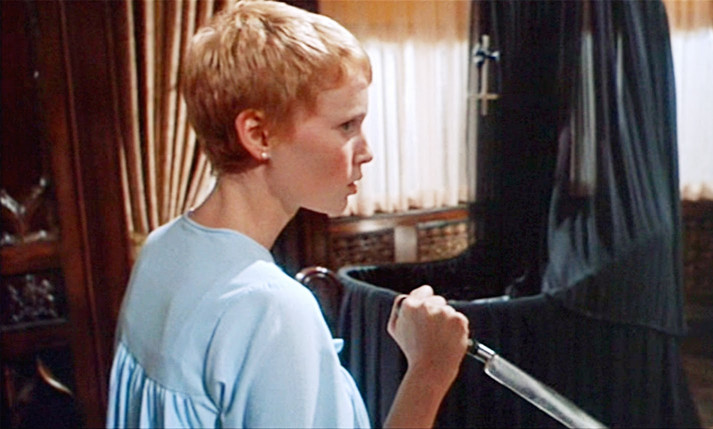
If you had seen both films, then you must have seen it coming at number one or in Top 3 at least. Even if the early reviews of the film often compared it to “The Exorcist”, “Hereditary” in fact has more in common with “Rosemary’s Baby” and it’s not just for the theme of maternity which is a subject so often explored in horror films.
The maternal instinct of protecting your child is universal and horror film directors loved to express the fear and anxiety connected with motherhood. “Rosemary’s Baby”, just like “Hereditary”, is a slow-burn horror film relies on creating realistic psychological terror and makes us feel uncomfortable with increasing paranoia in its tone.
As legendary movie critic Roger Ebert said in his review, “When the conclusion comes, it works not because it is a surprise but because it is horrifyingly inevitable. Rosemary makes her dreadful discovery, and we are wrenched because we knew what was going to happen–and couldn’t help her.”
Maybe if he was alive, he could very well have said the same about “Hereditary”. Both films have another thing in common: very committed acting performances, especially by their lead actresses.